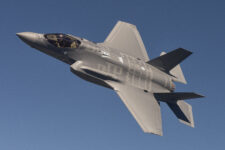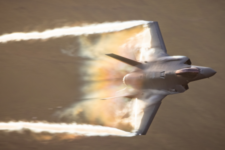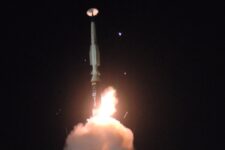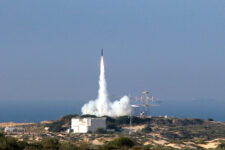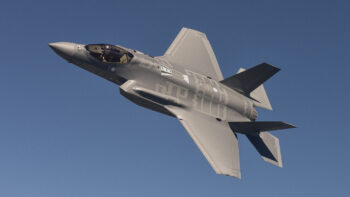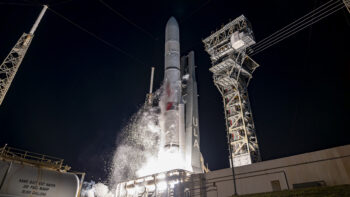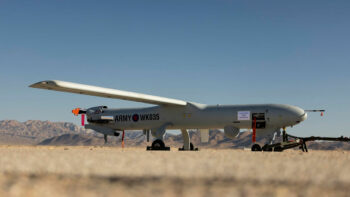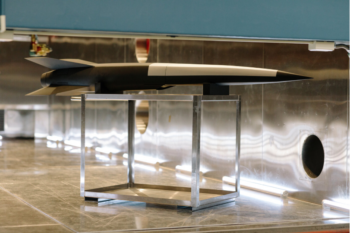
Air Force Gen. Glen D. VanHerck, commander of USNORTHCOM and NORAD, at Tyndall Air Force Base, Fla. in May 2022. (DoD)
WASHINGTON — The long-running battle over the Pentagon’s hold on a portion of radio frequency spectrum coveted by telecommunications firms heated up today — with the four-star general in charge of protecting the US homeland telling the Senate Armed Services Committee he is worried about his ability to detect incoming aircraft and missiles if access is lost.
“I am concerned about the potential national security impacts of auctioning or selling off that spectrum. It’s my assessment there will be impacts, as you pointed, out to our domain awareness capabilities,” Gen. Glen VanHerck, commander of US Northern Command and the North American Aerospace Defense Command, told SASC Chairman Sen. Jack Reed, R-RI.
“There are multiple platforms to include maritime homeland defense platforms, airborne early warning platforms, ground-based early warning platforms that enable me to provide threat warning, attack assessment, and defend from potentially airborne assets, etc.” that relay on the spectrum under debate, he explained.
That spectrum, 3.1-3.45 GHz, currently is allocated for Defense Department usage, primarily by ground-, air- and sea-based radars for detecting airborne and missile threats — in particular, the Navy’s Aegis Combat System that is the heart of its ballistic defense capabilities. The Aegis’s AN/SPY radar is one of the few US military systems able to track low flying, highly maneuverable hypersonic missiles.
But urged by the telecom industry chafing to develop 5G networks for mobile phones and internet services, the Federal Communications Commission (FCC) — as well as lawmakers sitting on the House and Senate commerce committees — are pushing to allow those RF frequencies to be made available to commercial firms. (The FCC regulates commercial spectrum usage inside US territory.)
This could be done by auction, which the FCC has favored for releasing other parts of DoD spectrum for commercial-only use, or by some sort of spectrum sharing scheme between military and commercial users. The telecoms and their supporters are pushing the FCC to be able to auction off the 3.1-3.45 band for commercial use as soon as possible.
As a March 16 report [PDF] by the Congressional Research Service (CRS) puts it: “While an auction of the segment for commercial use could drive wireless expansion and generate significant revenues, technical experts assert that reallocation of the band from federal to nonfederal use would require complex and high-cost modifications to DOD systems and would affect DOD operations.”
Indeed, DoD Assistant Secretary for Space Policy John Plumb told House lawmakers earlier this month that replacing just the Aegis radar with one capable of using different frequencies would likely cost $120 billion.
VanHerck, who is known for his plain speaking, forcefully argued during his SASC testimony that any decision should wait until after the Defense and Commerce Departments wrap up a study of whether, and if so how, the military could share use of those spectrum bands with telecom providers. The study is being spearheaded by Commerce’s National Telecommunications and Information Administration, which coordinates federal government use of spectrum.
“We need to understand the national security impacts of selling or auctioning and make a conscious decision before we do so,” VanHerck told the SASC.
VanHerck’s call for a delay echo those made by US Space Command Commander Gen. Jim Dickinson and Strategic Command head Gen. Anthony Cotton to the SASC earlier this month.
Of note, the CRS report states that Defense Secretary Lloyd Austin and Commerce Secretary Gina Raimondo on March 5 sent a letter to the relevant House and Senate committee chairs and ranking members endorsing a proposal by Sen. Maria Cantwell, D-Wash., that opened the door to spectrum sharing — but also the possibility that DoD could vacate the 3.1-3.45 band entirely. However, CRS explained, the letter caveated that “any decision to make the segment available for commercial use be contingent on a thorough study of potential impact on federal operations.”
Cantwell chairs the Senate Commerce Committee, and made the proposal as an amendment to the fiscal 2023 omnibus spending bill. However, it was rejected based on objections by Senators opposing any change to the status quo, including including key members of the SASC.
Romania signs LOA to secure entry to F-35 club
“This decision marks a significant milestone in Romania’s defense strategy and its commitment to maintaining a robust and advanced military force,” Lockheed Martin said in a statement.
